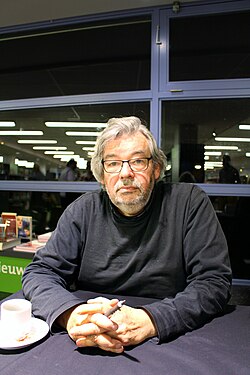Maarten van Rossem
|
prof. dr. Maarten van Rossem |
|
|---|---|

Van Rossem in 2013
|
|
| Born |
24 October 1943 Zeist, Netherlands |
| Residence | Utrecht, Netherlands |
| Education | drs., PhD |
| Alma mater | Utrecht University |
| Occupation | historian, writer, presenter |
| Years active | 1984–present |
| Notable work | De Verenigde Staten in de Twintigste Eeuw (1984) |
| Home town | Wageningen, Netherlands |
| Television |
Presenter Van Rossem in America (2009) Maliebaan in Beweging (2010) Maarten for President (2012) Van Rossem Vertelt (2012) Hier zijn de Van Rossems (2015) Frequent guest Pauw & Witteman De Wereld Draait Door De Laatste Show (2009) De Slimste Mens (2012) |
| Political party | Labour Party |
| Awards |
Dutch historian of the year 2003, 2010, and 2011 Republican of the year 2016 |
| Website | Maarten Online |
| Signature | |
Dutch historian of the year 2003, 2010, and 2011
Maarten van Rossem (born 24 October 1943) is a Dutch historian. He specializes in the history and politics of the United States. As an expert on America, he is a frequent guest on television political talk shows. His public career started when he was asked to comment on the 1984 vice presidential elections. He still makes regular TV appearances and gives frequent public lectures.
Born in 1943 in Zeist, Van Rossem grew up in Wageningen (Netherlands). In his youth he became fascinated with the United States through a visit from his three American cousins. When they came to visit his parents, they each had their own photo camera with them. This led him to think all Americans were rich.
He attended the grammar school in Wageningen, graduating in the exact sciences. Initially he studied pharmacy at Utrecht University, because of his high marks for chemistry. Because he disliked the subject, he secretly switched to studying history. His family opposed this decision, stating that this would only lead to unemployment.
As a student in the 1960s, he was expected to be leftist and radical, but Maarten chose not to go in that direction. He thought it would be very unlikely that there would be a revolutionary revolt against capitalism. Despite being brought up in a liberal environment, he joined the Labour Party in 1967.
He continued to be intrigued by the United States, collecting newspaper clippings on Martin Luther King, president Kennedy and the Chicago riots.
After eight years he graduated Cum laude. He wrote his senior thesis about the historiography of the Cold War with Hermann von der Dunk as his thesis advisor. Through his thesis he discovered the joy of writing: "You can say that at that point I became a historian".
...
Wikipedia
